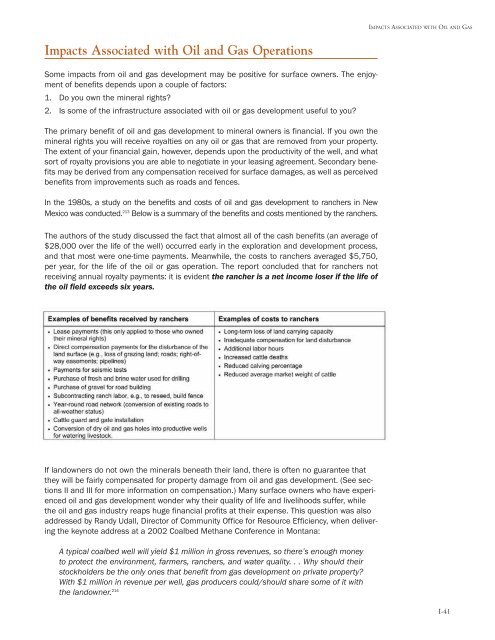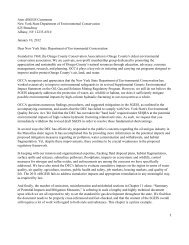Oil and Gas at Your Door? (2005 Edition) - Earthworks
Oil and Gas at Your Door? (2005 Edition) - Earthworks
Oil and Gas at Your Door? (2005 Edition) - Earthworks
Create successful ePaper yourself
Turn your PDF publications into a flip-book with our unique Google optimized e-Paper software.
IMPACTS ASSOCIATED WITH OIL AND GAS<br />
Impacts Associ<strong>at</strong>ed with <strong>Oil</strong> <strong>and</strong> <strong>Gas</strong> Oper<strong>at</strong>ions<br />
Some impacts from oil <strong>and</strong> gas development may be positive for surface owners. The enjoyment<br />
of benefits depends upon a couple of factors:<br />
1. Do you own the mineral rights?<br />
2. Is some of the infrastructure associ<strong>at</strong>ed with oil or gas development useful to you?<br />
The primary benefit of oil <strong>and</strong> gas development to mineral owners is financial. If you own the<br />
mineral rights you will receive royalties on any oil or gas th<strong>at</strong> are removed from your property.<br />
The extent of your financial gain, however, depends upon the productivity of the well, <strong>and</strong> wh<strong>at</strong><br />
sort of royalty provisions you are able to negoti<strong>at</strong>e in your leasing agreement. Secondary benefits<br />
may be derived from any compens<strong>at</strong>ion received for surface damages, as well as perceived<br />
benefits from improvements such as roads <strong>and</strong> fences.<br />
In the 1980s, a study on the benefits <strong>and</strong> costs of oil <strong>and</strong> gas development to ranchers in New<br />
Mexico was conducted. 213 Below is a summary of the benefits <strong>and</strong> costs mentioned by the ranchers.<br />
The authors of the study discussed the fact th<strong>at</strong> almost all of the cash benefits (an average of<br />
$28,000 over the life of the well) occurred early in the explor<strong>at</strong>ion <strong>and</strong> development process,<br />
<strong>and</strong> th<strong>at</strong> most were one-time payments. Meanwhile, the costs to ranchers averaged $5,750,<br />
per year, for the life of the oil or gas oper<strong>at</strong>ion. The report concluded th<strong>at</strong> for ranchers not<br />
receiving annual royalty payments: it is evident the rancher is a net income loser if the life of<br />
the oil field exceeds six years.<br />
If l<strong>and</strong>owners do not own the minerals bene<strong>at</strong>h their l<strong>and</strong>, there is often no guarantee th<strong>at</strong><br />
they will be fairly compens<strong>at</strong>ed for property damage from oil <strong>and</strong> gas development. (See sections<br />
II <strong>and</strong> III for more inform<strong>at</strong>ion on compens<strong>at</strong>ion.) Many surface owners who have experienced<br />
oil <strong>and</strong> gas development wonder why their quality of life <strong>and</strong> livelihoods suffer, while<br />
the oil <strong>and</strong> gas industry reaps huge financial profits <strong>at</strong> their expense. This question was also<br />
addressed by R<strong>and</strong>y Udall, Director of Community Office for Resource Efficiency, when delivering<br />
the keynote address <strong>at</strong> a 2002 Coalbed Methane Conference in Montana:<br />
A typical coalbed well will yield $1 million in gross revenues, so there’s enough money<br />
to protect the environment, farmers, ranchers, <strong>and</strong> w<strong>at</strong>er quality. . . Why should their<br />
stockholders be the only ones th<strong>at</strong> benefit from gas development on priv<strong>at</strong>e property?<br />
With $1 million in revenue per well, gas producers could/should share some of it with<br />
the l<strong>and</strong>owner. 214 I-41




